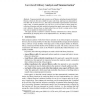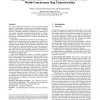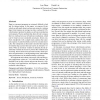114 search results - page 19 / 23 » Using likely program invariants to detect hardware errors |
108
click to vote
CAV
2007
Springer
15 years 8 months ago
2007
Springer
Programs typically make extensive use of libraries, including dynamically linked libraries, which are often not available in source-code form, and hence not analyzable by tools tha...
146
Voted
ASPLOS
2008
ACM
15 years 4 months ago
2008
ACM
The reality of multi-core hardware has made concurrent programs pervasive. Unfortunately, writing correct concurrent programs is difficult. Addressing this challenge requires adva...
128
Voted
DFT
2006
IEEE
15 years 8 months ago
2006
IEEE
Control flow checking (CFC) is a well known concurrent checking technique for ensuring that a program’s instruction execution sequence follows permissible paths. Almost all CFC...
115
click to vote
SENSYS
2010
ACM
15 years 8 days ago
2010
ACM
We present AutoWitness, a system to deter, detect, and track personal property theft, improve historically dismal stolen property recovery rates, and disrupt stolen property distr...
143
Voted
EUROSYS
2010
ACM
15 years 11 months ago
2010
ACM
Bugs in concurrent programs are extremely difficult to find and fix during testing. In this paper, we propose Kivati, which can efficiently detect and prevent atomicity violat...



